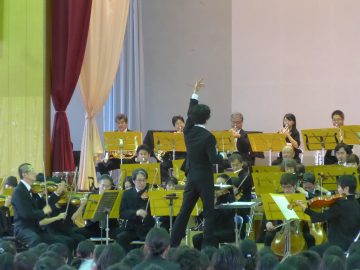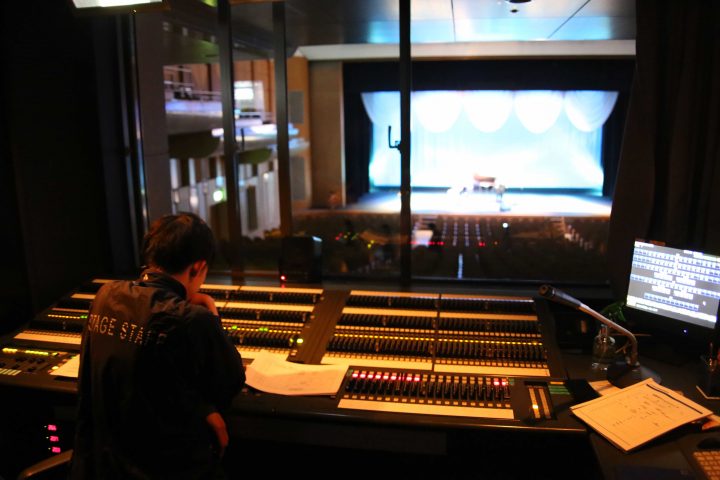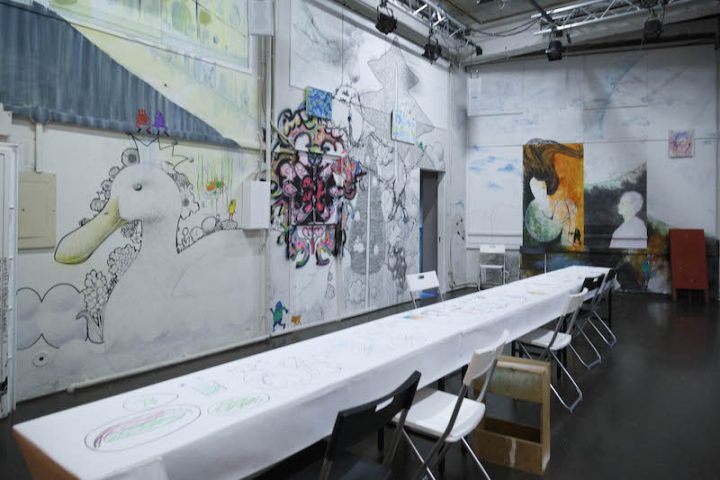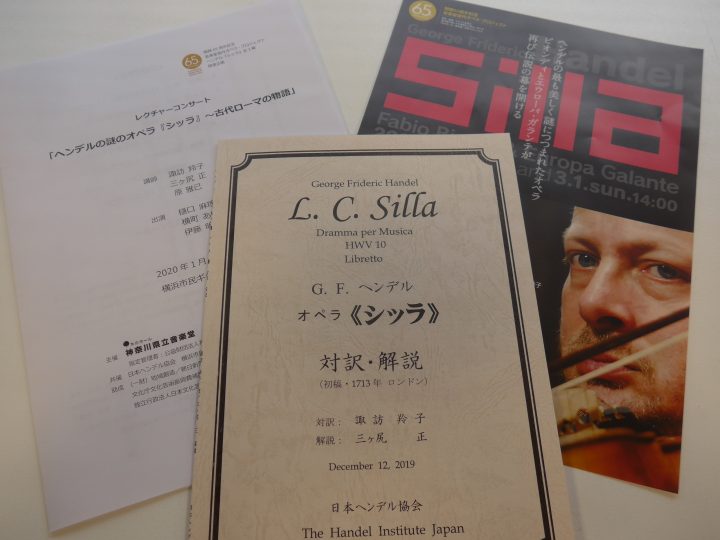Kanagawa Standing Drinking Culture Talk vol.2 "Drunkenness and Awakening"
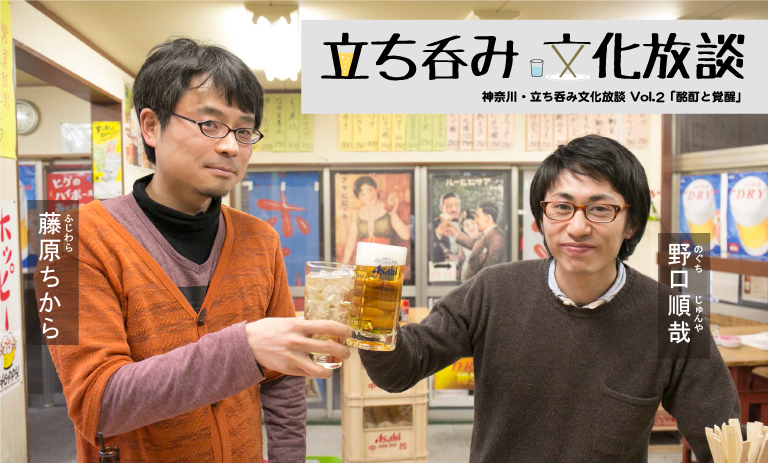
2014.7.1 Text: Akiko Inoue Photo: Masamasa Nishino
Chikara FUJIWARA
Editor, critic, and freelancer. Founder of BricolaQ. Born in Kochi City in 1977. Moved to Tokyo alone at the age of 12 and started living there. Moved around a lot after that, worked for a publishing company before going freelance. Edited magazines such as Ex-Po, Musashino Art University's newsletter mauleaf, and Setagaya Public Theater's CaroMag. Co-edited and co-authored with Tsujimoto Chikara "Book Guide as Architecture" (Meigetsudo Shoten). Co-authored with Tokunaga Kyoko "The Strongest Engeki Theory" (Asuka Shinsha). Currently lives in Yokohama. Involved in the launch of Theater Center F.
Junya NOGUCHI
Guitar/vocals for Kukan Gendai.
■ Kukangendai: Junya Noguchi (guitar/vocal) Keisuke Koyano (bass) Hideaki Yamada (drums)
Formed in 2006 by the three current members. They perform songs created with the ideas of editing, duplicating, repeating, and error as a three-piece band. Their live performances are characterized by their humorous yet stoic nature, which is caused by the twists and strains that this brings. In recent years, as an experiment in performance, they have been working on the construction and practice of a live performance format in which the entire time flowing during the live performance emerges as a single rhythm, even as they move between multiple grooves/songs running in parallel.
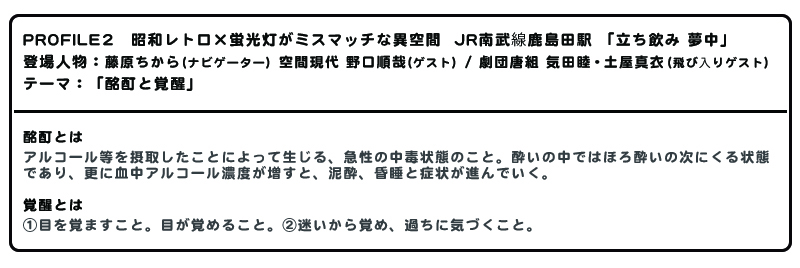
This is the second episode of the series, and this time, we welcomed Noguchi Junya (guitar/vocals) from the three-piece band "Kukangendai," who is also an acquaintance of Fujiwara and is known for their genre-crossing collaborations with Chiten, Ameya Norimizu, Ohashi Kaya, and Roro, to talk about the theme of "intoxication and awakening." The first guest, Kedada Mutsumi and Tsuchiya Mai from the theater company Karagumi, who were accompanying us for the recording on the same day, also joined us, making it a deep evening where the perspectives of music and theater intersected. Now, on to the main part.
But first, cheers!!
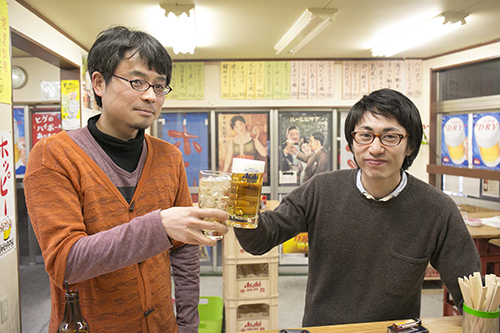
Fujiwara: My image of Noguchi is just a drunk guy (laughs).
Noguchi: Haha! I've never seen Fujiwara-san drunk before.
What kind of band is Kukangendai?
Fujiwara: Kukangendai's live performances start with a three-piece band looking at each other in a "triple stalemate." For example, you performed live at Chiten 's "Fatzer," and you've collaborated with various performing artists, but they require you to play an element that is not so-called background music (accompaniment) .
Kukangendai's music has the power to awaken your concentration in the moment, and I think that's what awakens you. For example, the feeling of being indulged in a certain theatrical performance and thinking, "Ah, this is making me cry..." is similar to the feeling of being drunk and intoxicated, but with Kukangendai, I feel "the more drunk I get, the more awakened I become." But Noguchi himself has a strong image of intoxication, so I've always wondered what that gap is.
Noguchi: Actually, the style of playing with three people facing each other is also a way to avoid getting intoxicated. Some people may say that they can't dance to our music, but I want to make music that you can dance to and drink comfortably, and that's why if we get intoxicated (by the music), we won't be able to play. That arrangement is also meant to convey the message, "Let's play without getting intoxicated."
Fujiwara: I see. I'm quite conscious of that.
Noguchi: I thought it would be more fun to interact with music in a rigid way that made me feel like I was being "moved by something," and to perform live.
Fujiwara: When I say we "fit into a mold," people who haven't listened to us before might misunderstand, but there are absolutely no elements that fit into the mold of existing band music.
Noguchi: In that sense, it's the opposite. The "kata" I just mentioned means something like a pitching form. No matter how innovative a throwing method you discover, the concentration of throwing by imitating that form after training and getting it down to a point where you can do it well is completely different from the concentration of throwing with a new form by improvisation. We think it's better to first decide on the form ourselves and then try to imitate it.
Fujiwara: Was there anyone you used as reference?
Noguchi: There are quite a lot of them. There are some that are like, "That's a rip-off!" But it's not a rip-off at all (laughs).
Fujiwara: Ah, I couldn't copy it completely, so that's why it ended up like that...
Noguchi: Yeah. But I was like, "That's interesting, isn't it?" (laughs)
Video provided by Chiten
Dine-and-run incident occurred?!
Fujiwara: By the way, how is your drinking life these days?
Noguchi: I was still a university student when I first met Fujiwara-san, but it feels like I've finally gotten over that university vibe (laughs).
Fujiwara: Well, that's to be expected... (laughs)
Noguchi: I think that maybe I've failed so many times that now I'm thinking, "Maybe I should settle down a bit."
Fujiwara: I've witnessed that failure happen a few times (laughs).
Noguchi: Sorry for the inconvenience.
Here comes the pork belly vinegar miso .

Noguchi: Ah, guts are delicious!
Fujiwara: The vinegared miso is also good! (To the counter) "Chef, it's delicious!"
Chef: Ah, thank you very much (blushes)
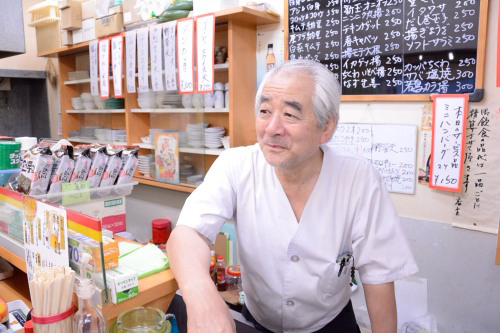
Chef (a little shy)
Noguchi: Speaking of which, the other day I went to Fukuro (a popular izakaya in Ikebukuro) by myself, and after I sat down and ordered, I looked in my wallet and only had 100 yen in it... So now I don't remember the taste of my first beer at all (laughs).
Fujiwara: LOL!
Noguchi: In the end, I pretended to go to buy cigarettes and tried to withdraw money from an ATM, but when I timidly brought it up, the lady at the store kindly introduced me to a convenience store just a minute's walk away. However, I knew that the convenience store didn't handle my bank, so I ran to the faraway 7-Eleven (laughs).
Fujiwara: Ah, that's the 7-Eleven over there.
Noguchi: Yes. He ran, but it took him more than five minutes, and because he was so slow, everyone started saying things like, "Maybe he ran off without paying."
Fujiwara: Hahaha!
Noguchi: So when I opened the door to the bar and returned to my seat, I heard a voice in the distance saying, "So it wasn't a dine-and-dash spree," and I realized, "Oh, so they were messing with me..." (laughs) I did have a new pack of cigarettes in my hand, though.
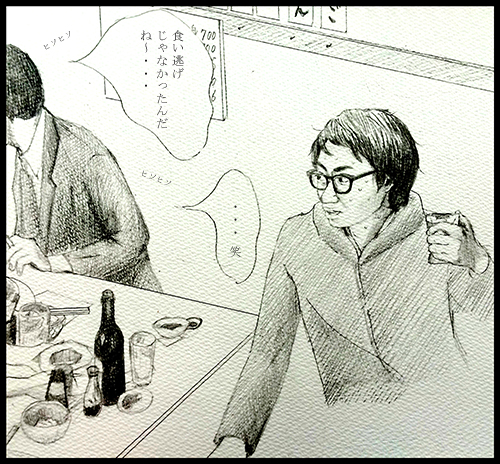
Illustration: Kanae
Fujiwara: But I think people were expecting me to do it. Like, "He ran away!" (laughs)
Once I was present at a bar where someone dine and dashed while sitting at the counter, and all of a sudden the man walked out, and at that moment the old lady working at the bar shouted at the top of her lungs, "It's dine and dash!!!"
Noguchi: That's a big increase (laughs)
Fujiwara: Then one of the young guys from the store jumped over the counter and chased after him, and caught him in no time (laughs).
Noguchi: What? He got caught!
Fujiwara: Yeah. I was shocked. It was like I had just witnessed a dine-and-dash.
Noguchi: Going back to what we were saying earlier, it makes you feel like it's a beautiful sight.
Fujiwara: I guess everyone has high expectations. So when Tadanoguchi appeared, I think the people who were there had fun for those five minutes. Like, "I wonder if he ran away, what will happen..."
Noguchi: Lol
Dine-and-dash is an "awakening"
Fujiwara: Leaving aside the dine-and-dash incident, and speaking in line with the theme of this episode, "intoxication and awakening," I think that even though they were basically intoxicated, the customers in the bar at that moment were watching with a certain tension and a sense of awakening about whether Noguchi would return.
Noguchi: I see. I'm starting to understand what you mean by "awakening."
Fujiwara: But well, let's go for a drunken mood today. To be honest, I'm in a drunken mood (laughs).
*As previously mentioned, this recording was Fujiwara's second bar of the night.
Noguchi: Then I'll go for Hoppy.
Fujiwara: There are three colors: white, black, and red.
Noguchi: Then red.
Fujiwara: Excuse me, can I have one set of Red Hoppy please?
Chef: Yes.
Here comes the famous cheese steak!

(How to eat) Add Tabasco to taste and cut with your hands before eating.
Noguchi: Eh, you cut it by hand?
Fujiwara: Really? It's amazing how much attention to detail the master has.
Noguchi: Solid? This. Eh? Ah! I get it, that's it!
Yummy!!
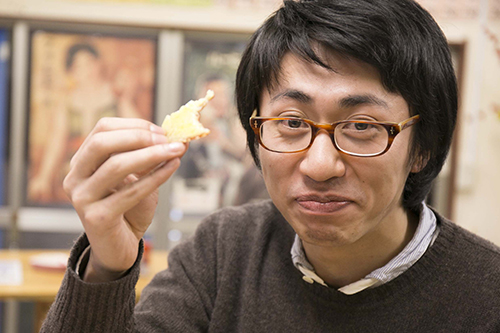
Fujiwara: This is good. It's not pizza. I don't know, it's delicious!!
And, over the cheesesteak, two members of the Karagumi theater troupe (Kita Mutsumi and Tsuchiya Mai), who had been accompanying us, joined the conversation.
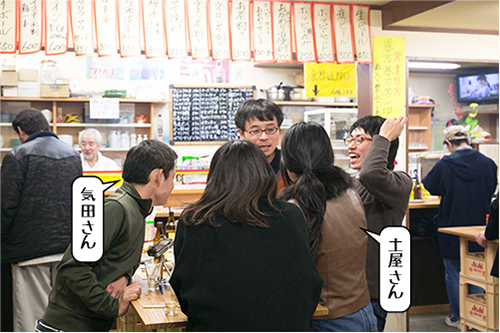
Fujiwara: I'm eternal. The only thing that stops me is the last train. And even the last train doesn't stop me...
Kita: “The railroad tracks go on forever”!
Karajuro x Kukan Gendai? !
Fujiwara: One thing I forgot to ask the two members of Karagumi at the first show (episode 1) was that I was wondering what it meant when they both listed "piano" as their special skill in their profiles.
Kida: I learned to play the piano, so I can play it pretty well. But for me, who does theater, it's unfair because it hits you right in the heart without even using the word "music" - I'm like, "Damn it!"
Fujiwara: I understand that (drunk) . But, of course, theater and music go well together.
Tsuchiya: I think so. When I thought about why plays are written as "songs," I thought it might be because there is a connection between music and theater.
Fujiwara: I feel that musical scores and plays have something in common in the sense that they both contain written instructions.
Tsuchiya: There are assigned roles for the sounds, and just like in theater, there is communication in music, too. Like sessions.
Kita: Jazz is probably the easiest to understand.
Fujiwara: I just had a wild dream, but if Kara-san and Kukangendai were to mix together, I would like to see it. It might be a bit presumptuous, but... well, I guess it could happen.
I think Kara Juro's indigenous energy contains a certain lyricism, but what would happen if he were to challenge it with the aggressive music of Kukangendai, which is different from pop songs that further stimulate lyricism? However, you can't really get intoxicated by lyrical music. I think getting intoxicated means "shifting half of your body to another world," and when you listen to Kukangendai's music while you're intoxicated by a story or space, it's like you're taken to yet another world...
Kita: That's amazing.
Noguchi: This is especially true for pop songs, but they have a "surface" feel to them. When I worked with Naoyuki Miura of Roro , there was a scene where we had to play an unpleasant sound along with the song, and in the middle of it, we played a song by Takuro Yoshida. At that time, Miura said, "The reason I can only use pop songs is because I can present a frame that says 'this is the song.'" In other words, in my interpretation, pop songs come as a "surface," so even if a part of it is cut out and played, the listener can somehow recall the parts that were not heard.
Fujiwara: I see.
Noguchi: But that's the difficulty when we try to do the same thing. It's hard to create a clash of surfaces. So I thought about collaging different songs. That's why I've been doing a little different live performances lately, inserting a fragment of song B while song A is playing and then going back to A. When I started doing that, I thought I was creating an antagonistic relationship between the "surfaces," like the clash of pop music and noise.
A live discussion of music and theater
Fujiwara: Your latest album, LIVE, truly embodies this kind of antagonism. At first glance, Kukangendai's performance style may seem stoic, but when combined with the stage performance, it shows incredible communication ability, so I hope everyone will listen to it.
.
Watch YouTube here
Kita: Are you conscious of “breaking things down”?
Noguchi: If we continue like this, this is what will happen, so there are times when we think, "Let's dislocate him here."
Kita: Like breaking the expected harmony?
Noguchi: Yes. At first, we thought about how to break down the existing songwriting style of a rock band with guitar, bass, and drums. Then we started experimenting and a change of direction started to happen. By the way, rhythm was the keyword from the beginning. The rhythm of the bass and drums is constant, but the guitar plays a completely different song, or all three of us go off on our own, or the two of us are together and only one of us does something different.
Conversely, this time I started making consistent rhythms, and in the end it became a four-on-the-floor beat like easy-to-understand dance music... It all comes from the desire to dislocate, but recently there are more and more moments where it's hard to tell what is dislocated and what is the main point.
Kita: That's what's amazing about " live ." When we're re-performing dozens or even hundreds of plays that Kara Juro wrote, what we do to maintain a "live" state is to create a state of flow that isn't a pre-established harmony. How far can an actor go with "live"? It's creating a state where you don't just think, "Oh, he's going to talk there." Listening to it now, I'm thinking that this is the same thing.
Noguchi: I think there are some areas of resonance.
Kida: It's the same with theater. In fact, all theater is like that.
Noguchi: In theater there is a word called revival, but if we go back to the previous point about "sheet music, plays, and scores," isn't all music a revival? There are plenty of bands that have been playing the same songs every time they perform live for about six years. Band members don't think that a revival will lead to staleness. In fact, songs that have not been performed in a long time are often better. So in that respect, theater and music are obviously completely different. But being aware of that difference, when you re-perform an old play after several years, the struggle of how to create a "live" feel really resonates with me.
Kita: Theater needs to work a bit harder, but music touches you directly, so I think musicians are overwhelmingly conscious of "live."
I feel frustrated. Because music hits you in the heart . Also, it takes away one thing from music in the sense that you don't have to watch it. For example, when a musician makes the sound "raa", it makes you go "Hmm!! (I'm moved) ", but if we say "raa", it doesn't do anything. Because first you have to be understood.
Noguchi: But I think we're both struggling. Because the effort required to produce an "La" that moves people is the same as the question of whether it's "raw" or not. It's the same thing about producing an "La," but producing an "La" that reaches the listeners is a very difficult task.
Kita: That's it! Yes, it's a lot of work.
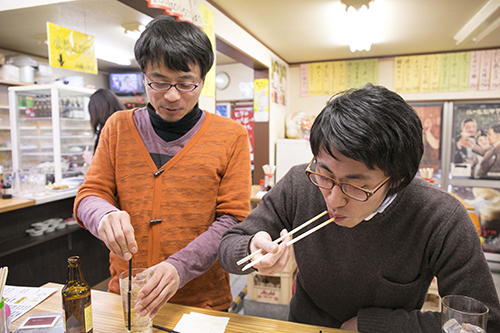
The buzz of theater
Noguchi: The first play I saw, through Fujiwara's blog and Sasaki Atsushi's introduction, was Hibye's "Recycle Shop 'KOBITO'" and I remember feeling intense jealousy. That was the first time I experienced simultaneous multiple conversations with about seven actors all saying different things. So I thought, "I really want to do this, but I can't do it..."
In theater, when an actor stands on stage and speaks, each person's lines become a single entity. But in music, when one person plays a drum, it doesn't become a single entity. So, while it's virtually impossible for Kukangendai to have multiple simultaneous conversations, when the actors are there and they're all saying different things, that noise comes together as a song.
Fujiwara: That may be true.
Noguchi: It's difficult to express that feeling in a live performance of a song with three instruments, so I was very jealous.
Fujiwara: I think that both erasing yourself and revealing yourself are what makes being an actor interesting. Actors have to play people they're not, so they're probably interested in other people, but at the same time, I think they can't help but have that "but it's still me" part.
Kita: Yeah, that's true.
Fujiwara: I think "bustling" is the ultimate combination of both of these things.
Noguchi: Each actor has several different names, including actor names, real names, and character names, so if, for example, three actors were to talk at the same time about something that happened recently, that alone would create a buzz.
Kita: Is the reason why music can't create a buzz because it's contained within the notes do-re-mi-fa-so-la-ti-do?
Noguchi: Rather, I think it's because when a person with ears hears the sounds made by various kinds of instruments, they have a strong tendency to make them sound like one piece of music. But with the rule that lines in theater must be spoken at the same time, different things can be made to sound different. In music, even if different things are done, it's perceived as one, as an "ensemble," but in theater, if multiple people say different things, you think, "Huh? Did they just say different things?"
Kita: I see, I see, so they don't become just one.
Noguchi: No, I can't. Because I have a role.
Kita: I see. I don't like difficult topics, but this is very interesting.
"24 Billy Milligans" appearing while intoxicated
Fujiwara: Let's go back to the topic of intoxication and awakening. I think it's important for something to happen, and just like the dine-and-dash incident, all sorts of things happen when you're drinking.
Noguchi: The important thing is that when you're intoxicated, you have zero attention to what's happening. I think that intoxication is now being treated as the opposite of wakefulness, but the truth is that we still don't really understand what intoxication feels like.
Fujiwara: Ah... Basically, awakening is when something is happening. Conversely, intoxication is a state in which nothing is happening. There can be a kind of euphoric state in a play or live music performance, but in that state, the "events" that I think of don't happen. I think it's just a state of consuming something you like.
Noguchi: I see. But I think it would be more interesting to talk about drunkenness as something okay, rather than viewing it as bad. Isn't that amazing? I think there are some people who would say that.
Keda: I love being drunk. There was a time when I felt bad that I didn't remember anything, but now I've entered the "it's okay" stage.
Noguchi: So "It's okay" means that when I'm intoxicated I'm "not myself"?
Kita: It's painful to think like that, so I try to think of it as a book called "The Faces of Billy Milligan."
Noguchi: There is a part of me that is intoxicated, but there is also a part of me that is awake.
Kida: Right. It's okay, they're there.
Noguchi: They could all be me, or they might not all be me, but there's a part of me that gives the OK to everyone.
Kida: Yeah. Even if it's a bit of a hassle, I don't think it's too bad since I haven't killed anyone.
Fujiwara: That may be true, yes.
Awakening = Provocation
Noguchi: Going back to the main topic, if you say "Drunkenness is good, right?" then I think some people will say that drunkenness is fine.
Fujiwara: But I think awakening is absolutely necessary.
Tsuchiya: I think it's necessary too. Without awareness, you can't communicate.
Fujiwara: I think awakening is about giving stimulation. Isn't that important? I think so. I'm not interested in drunk people saying things like "That was fun." If I'm this drunk right now, it's not very convincing...
Kida: If there is intoxication, wakefulness, and normality, and wakefulness is a special state, I think it is no different from intoxication. I don't believe that at all.
Fujiwara: Maybe I just want to say "we need to be awakened." I think what Kukangendai is doing with music is a kind of provocation. To the way we listen to music. To our ears, our brains, and our eyes. I think that provocation is one of the artists' jobs. I'm sure Kara's plays have that as well, and "Privileged Body Theory" was a kind of provocation to the existing theatrical situation at the time. When I say provocation, it might sound like I'm trying to pick a fight, but I think it's basically an exchange, a communication with the person in front of you. I mean, don't ignore that.
Noguchi: Yes. If provocation wasn't important, then there would be no cultural communication at all.
Fujiwara: That's right.
Noguchi: In other words, intoxication is the absence of that.
In my interpretation, for example, if we get excited talking about a band called A, and a middle school student who knows nothing about it asks, "What is A?", I think it would be provocative to say, "You don't even know A?" However, in the relationship between me and Fujiwara-san, I think a conversation that ends with "A is awesome, isn't it?" or "Ah, ah, ah" would be drunken.
Fujiwara: Yes. That kind of talk will go away once we sober up. I want to get to the core of things more than that.
Noguchi: I see, so there is a core that is not like that.
Fujiwara: Maybe there is.
Noguchi: It's the core of Fujiwara-san.
Fujiwara: Yes, maybe there is. But maybe there isn't... (← drunk)
Everyone: Huh??? (laughs)
Kida: I'm drunk...
Noguchi: I'm completely awakened now (laughs).
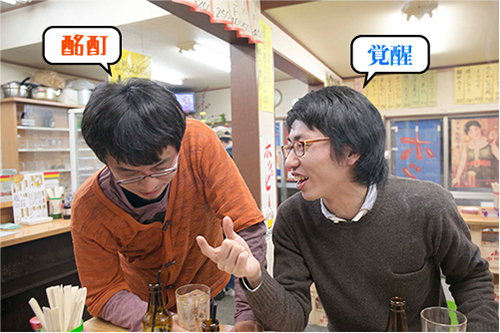
Fujiwara: ...I'm getting a counterattack. I had planned to get Noguchi drunk, but...
Everyone: lol
Noguchi: This is my first bar today, so I'm totally relaxed! By the way, this is a provocation, isn't it? (laughs)
Fujiwara: Yeah, I'm completely consumed. It's crazy.
Tsuchiya: What's with this weak feeling? (laughs)
Fujiwara: Right now, I'm losing 7:3. But it still piques my interest.
Tsuchiya: Please lose, Fujiwara-san. Lose properly.
Kita: No, but Fujiwara is the type of person who wants to do his best.
Noguchi: Yes. I want to accept it, and I want to brush it off as a technique. But I have to accept it first (laughs).
Fujiwara: ...This is intoxication and awakening. So intoxication and awakening actually come at the same time. This is it, this. Intoxication and awakening come at the same time!!
(We were still in the middle of the story, but we couldn't get any further, so we decided to take some photos.)

Kida: So? What happened? It doesn't solve anything.
Noguchi: ...I don't really understand it either.
Fujiwara: That's right...
Staff: Isn't it LOVE?
Fujiwara: No, I don't think you can just explain it away as love.
Noguchi: But we're holding hands here.
(Fujiwara and Noguchi holding hands)
Tsuchiya: What is this?
Kita: Yeah, I understand that the two of them are good friends.
Fujiwara: I just love Noguchi.
Everyone: LOL!!!
Then the two of them returned to Kashimada Station together.
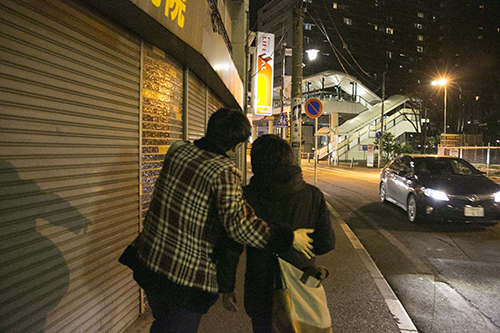
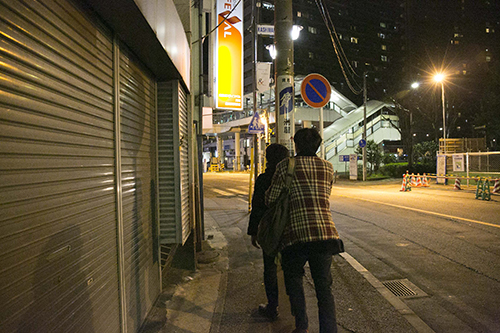
End
Here is the store information
This time, we were treated to "Tachinomi Muchuu"
http://tabelog.com/kanagawa/A1405/A140503/14036023/
Closed: Sundays and public holidays
Address: 1133 Kashimada, Saiwai-ku, Kawasaki City, Kanagawa Prefecture
Phone: Not disclosed
Access: 2 minutes on foot from Kashimada Station
Business hours: 17:00-24:00 *Entry possible after 10pm
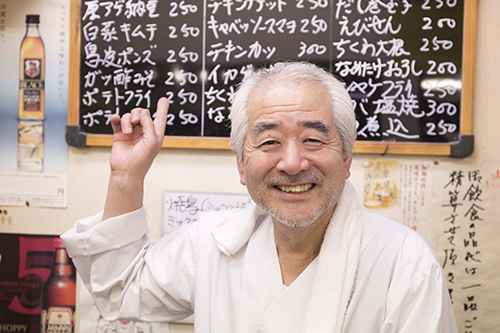
General
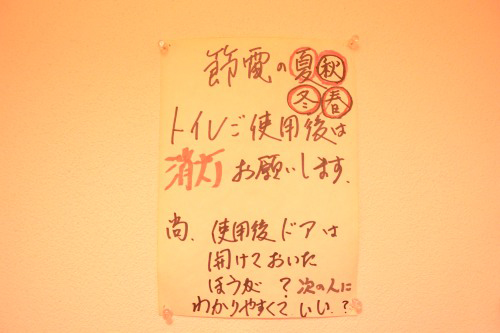
The kindness of the chef is evident even in the sign posted in the restroom.
And here is the food we had this time.

I recommend:
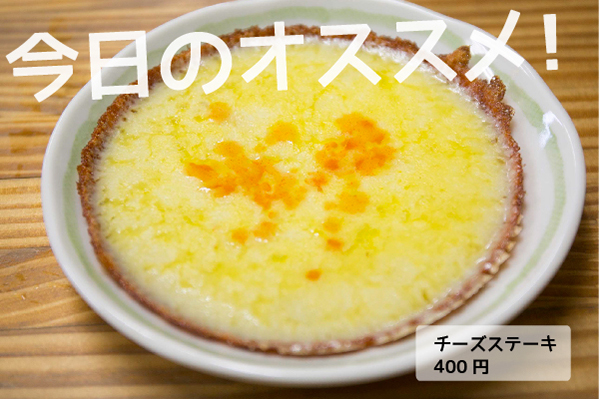
> Stay tuned for next time!
《Announcement》
■ A role-playing play set in the southern half of the Keihin Kyuko Line, written, directed and edited by Chikara Fujiwara
<This event has ended.>
"BlanClass × Theater Center F Co-hosted Project: Walking Theater | BricolaQ [Theater Quest Keikyu Fuzuki Edition]"
7.12 (Sat) Doors open at 13:00 Performance starts at 13:30
*Meet at BlanClass in Idogaya. A touring performance that travels around the Miura Peninsula
■ Kukangendai LIVE
<This event has ended.>
“Kukan Gendai x Spot” 9.1 (Monday) Doors open at 18:30 Starts at 19:00 @Super Delux
